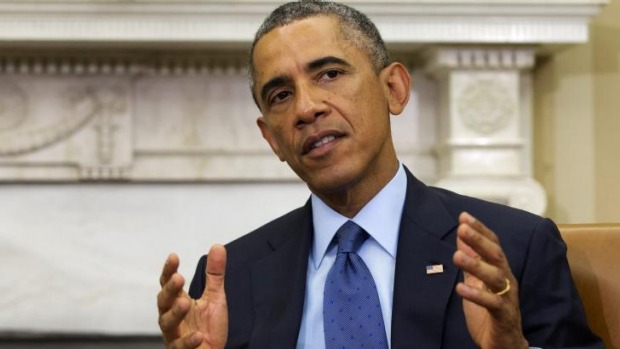Obama gearing to be war president

Dan Murphy Correspondent
Barack Obama’s meteoric rise to the presidency probably wouldn’t have been possible without his decision to stake out a strong position against the Iraq War while still an Illinois state senator in October 2002. In a speech in Chicago that month he warned of “a dumb war. A rash war. A war based not on reason but
on passion, not on principle but on politics.”
Mr Obama’s position – out of step with most of the US political establishment at the time – helped put him on the national radar. It helped him land the keynote slot at the Democratic National Convention in 2004, and he campaigned for the presidency in 2008 promising to end the, by then, deeply unpopular Iraq war. At the end of 2011 he declared “mission accomplished” on that promise.
Now, with two years left in his presidency, Obama is positioning the US for more war. His dismissal of Secretary of Defence Chuck Hagel yesterday appears to be because the job the Nebraska Republican was brought in to do is no longer the task at hand.
Mr Hagel was charged with bringing the Afghan War to a close and to manage a shrinking Pentagon budget. But Obama is now fighting two wars in all but name in Iraq and Syria, and he recently authorised a far more expansive combat role in Afghanistan for US troops than anything previously discussed. Hagel, an outsider among Obama’s close and trusted confidants like National Security Adviser Susan Rice, is now likely to be replaced by someone he personally trusts and who won’t chafe at what critics of the president have described as a micro-managing style. One of the rumoured front-runners among DC-based pundits is Michèle Flournoy, who served as under secretary of defence for policy between 2009 and 2012 and studied international security at Harvard’s Kennedy School.
Ms Flournoy was also considered a front-runner for the job two years ago, when Hagel was eventually picked as the less hawkish of the two options. But whomever he chooses, Obama appears to have grown more hawkish himself, and defence policy is going to reflect that. On Friday, the White House let it be known that the president had authorised a direct combat role for US troops in Afghanistan beyond the end of this year, an about-face from last May, when Obama said:
“Together with our allies and the Afghan government, we have agreed that this is the year we will conclude our combat mission in Afghanistan . . . America’s combat mission will be over by the end of this year. Starting next year, Afghans will be fully responsible for securing their country. American personnel will be in an advisory role. We will no longer patrol Afghan cities or towns, mountains or valleys. That is a task for the Afghan people.”
America’s top brass was never really happy about that, well aware that the Taliban remained strong; many of them believe that more counterinsurgency after 13 years of war could still turn the tide. Obama’s surge of 30 000 troops into the country in 2010 was the last roll of the dice in this direction, and at the time he seemed determined that there wouldn’t be any more.
His position on Afghanistan has clearly shifted, in part thanks to the collapse of huge portions of the Iraqi Army in the face of the so-called Islamic State earlier this year.
If the Iraqi Army, built in a country with greater wealth, better infrastructure, and dramatically higher literacy levels, could collapse in the face of a determined foe, what of the Afghan one?
The New York Times reports that Obama is now more inclined to listen to the generals he sidelined four years ago than civilian voices of restraint:
The military pushed back, and generals both at the Pentagon and in Afghanistan urged Mr Obama to define the mission more broadly to allow American troops to attack the Taliban, the Haqqani network and other militants if intelligence revealed that the extremists were threatening American forces in the country. The president’s order under certain circumstances would also authorise American air strikes to support Afghan military operations in the country and ground troops to occasionally accompany Afghan troops on operations against the Taliban.
“There was a school of thought that wanted the mission to be very limited, focused solely on Al Qaeda,” one American official said. But, the official said, “the military pretty much got what it wanted.”
Meanwhile, the US military role in Iraq and Syria is deepening. The Pentagon is hoping to arm Sunni tribesmen in Iraq to fight the Islamic State, notwithstanding the horror inside the Shiite government in Baghdad at the notion of arming a group of people it views as enemies of the state. Consider too that Gen.
Martin Dempsey, chairman of the joint chiefs of staff, said earlier this month he was considering recommending more troops for Iraq and may embed US advisers with Iraq combat units.
So far this year, the US has conducted about 900 air strikes in Iraq and Syria.
As the saying goes, sometimes war is interested in you. And Obama, at least for the moment, is reciprocating. – The Christian Science Monitor.










Comments